|
|
Verna
Forncrook Wilson VERNA ELIZABETH FORNCROOK
I
was born October 23, 1912 in Bainville, Montana, the second child
of Leon Dale Forncrook and Bertha Anne Hruska. My nationality is
Bohemian and German on my mother's side and English and Holland Dutch
on my father's side. My brother who was born before me, Virgil Wayne,
died Sept. 11, 1911.
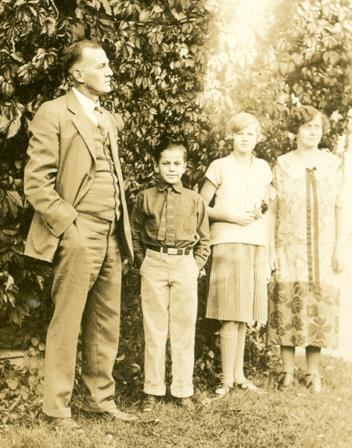 Leon D., Dale, Verna and Bertha Anne Forncrook circa 1927. When I was quite young I was entered in a baby contest and won a prize of a locket and chain and a movie film of me. I have both of these prizes in my possession now. When I was a year old my parents and I moved to Plentywood, Montana. Both small towns are located in the northeastern part of the state. I do remember the very cold winters there. There was lots of snow. Our house was heated with a coal-burning stove and a wood-burning cook stove in the kitchen. Storm windows and doors were put up in the winter. The summers were hot and dry with tumbleweeds blown against the fences. Plentywood had very few trees. It was a prairie country where sheep were raised. In 1921 we moved to Medford, Oregon. Many of our friends from Plentywood, the Dietricks, the Wiselys and Uncle Roy's family, had moved out West, so it was time for a move. Dad must have had a job already in Jacksonville, as he went to work right away. He was deputy sheriff from 1921 to 1927. 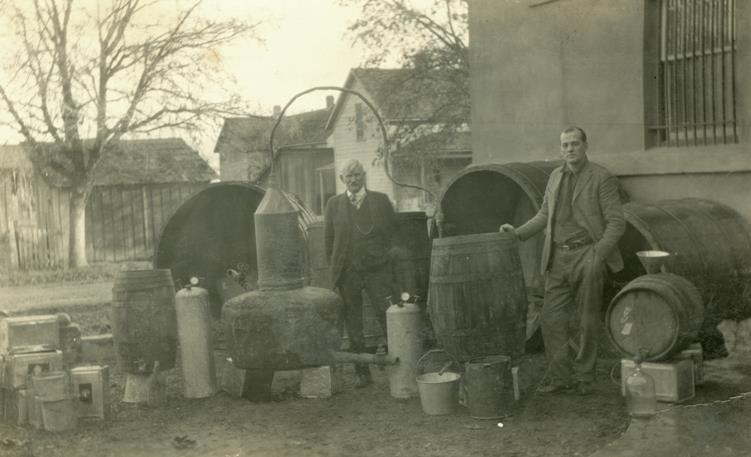 Sheriff Charles Terrell and Deputy L. D. Forncrook behind the county jail in Jacksonville, circa 1922. 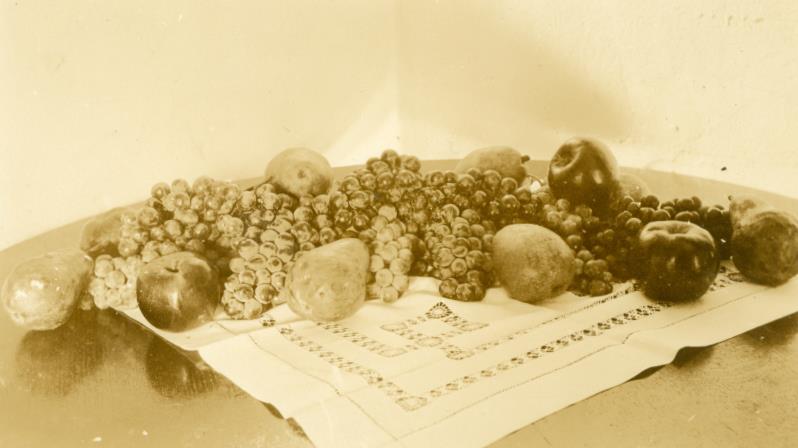 The amazed Forncrooks photographed this still life on their kitchen table in 1921. Our first house was in Madame Jefferies house. Then we moved to 529 South Grape Street, 1921 to 1929 or so. This was a one-bedroom house, but later a big back porch was built--great for summer sleeping but very cold for the winters, as it wasn't fully enclosed. It just had drop canvas over the screened-in windows. Growing up on Grape Street was great. I remember so many things about this place. Oregon was so different from Montana--so many fruit trees--the land of plenty. In the summertime we played until morning until night. Dad shaved Dale's head--real cool--and Dale went barefoot all summer long. He had homemade guns and swords, stilts, scooters made from apple boxes and skate wheels. We put tin cans on the bottoms of our shoes to make a lot of noise. With shoes on, just press hard on an empty can and make it stick to your shoes. We didn't have many store-bought toys. 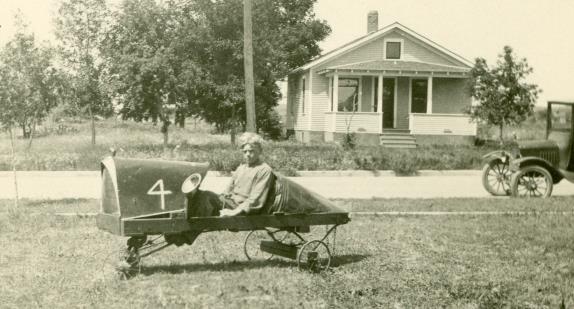 Verna's cousin Ralph Twight. We always had new clothes for the beginning of the school year. My mother always got our clothes way too big or too long for both Dale and me. She said we were growing so fast that we would grow into them. And we did. I remember a middy blouse I wore for many years. Also I had a cape with a pretty lining--one does not outgrow a cape. 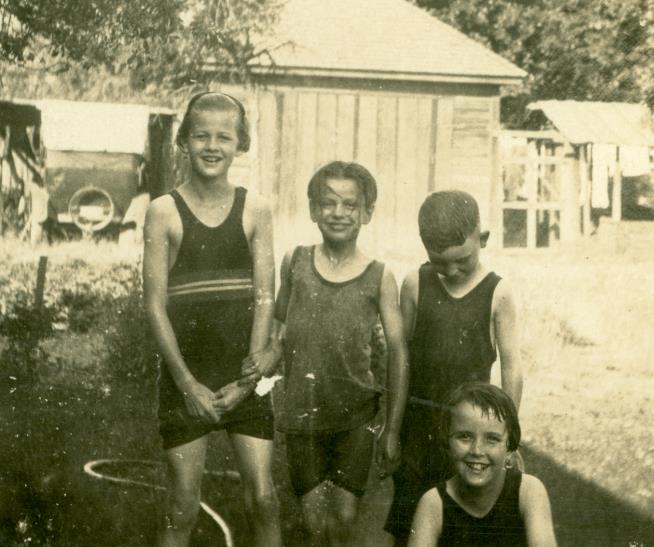 From left: Verna and Dale Forncrook with Elmo and Virginia Dunlava, circa 1925 We kids looked forward to the ice man, who came around about once a week in the summertime. Mother would put out an ice card showing how many pounds of ice we needed. The ice man in his truck would chip off the amount needed with an icepick, then put a burlap sack on his shoulder and use ice tongs to carry ice into the house. There were no electric refrigerators at this time. We kids would gather the bits of ice in his truck and make an iced drink out of it by pouring juices over it. Real great. Some of the games were played were Hide and Seek, Run Sheep Run, Kick the Can, Ante Over (throw the ball over the house). We played Cops and Robbers, but I didn't like this game, as the boys were too rough. When it got to be dark outside in the warm summers we would sit on the curb under the street lights and tell ghost stories, and watch the bats fly near the streetlights. One by one we were called in to get ready for bed. Our house at that time was on a dead-end street--about ten kids were in that one block. I'll bet we were a noisy bunch. The open fields were a fun place. At times it was a wheat field and had a haystack--we played king of the mountain. At other times it was a place for a circus or a carnival. This was great so close to home. After the circus pulled out, the next day we kids would case the place for money or anything left there. We saved everything: String, cigarette foil, paper sacks and cigar bands for rings. Nothing was wasted. Entertainment in these early days was family gatherings, picnics and going to dances. 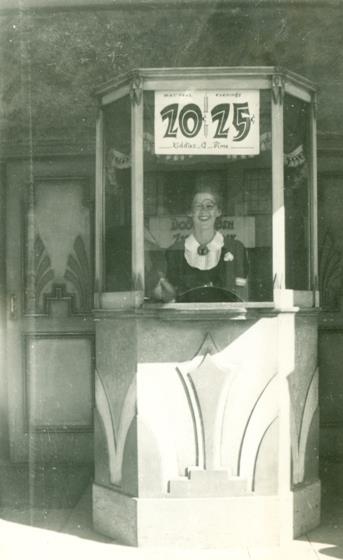 I
graduated from high school in 1931 and attended
Medford Business School. The last two years of high school I worked in
the Isis Theater, in silent picture days. I was the record changer
(dual disks), that furnished music. No talkies then. In 1932 I worked
for the Roxy Theater as cashier until 1938. I also worked in a
government loan office, typing. Other work places were Snider's Dairy
and Consolidated Freightways. I
graduated from high school in 1931 and attended
Medford Business School. The last two years of high school I worked in
the Isis Theater, in silent picture days. I was the record changer
(dual disks), that furnished music. No talkies then. In 1932 I worked
for the Roxy Theater as cashier until 1938. I also worked in a
government loan office, typing. Other work places were Snider's Dairy
and Consolidated Freightways.In 1947 I moved to Canyonville, Oregon, a quaint little town. There were no doctors, hospital, bank or lawyers here then. One had to go to Myrtle Creek or Roseburg for these services. The Pacific Highway came right through town, and many of the sidewalks were made of wood. Logging and farming was the main industry. Alcan Lumber Mill was just off Main Street. Over the holidays Christmas of 1948 I was hired as a temporary worker, which became permanent--thirty years. The first post office was in the Mesick building, having moved from a corner in Gordon's Drug Store. All mail came by train to Riddle, then by a small truck to Canyonville. Our office heat was a wood stove. The outgoing mail was tied by string. Later the post office moved to the back of Binders Store, then to the present place on 2nd St. I retired after 30 years of service. "I served my time." Looking back, oh, times certainly have changed in my 90 years. All these technology gadgets I don't understand. We kids didn't use the phone as they do now. Compiled from several brief autobiographies by Verna Forncrook Wilson, circa 1997-2002. See also Verna's reminiscences of the Isis and Roxy theaters. Last revised July 15, 2010 |
|

